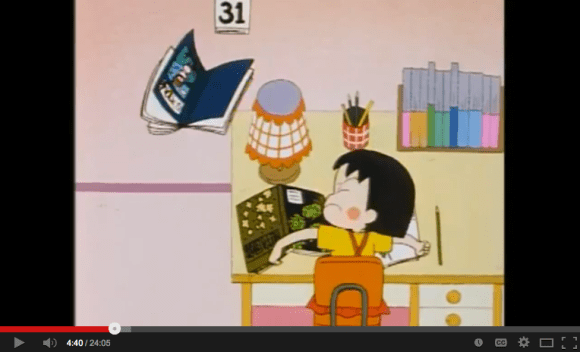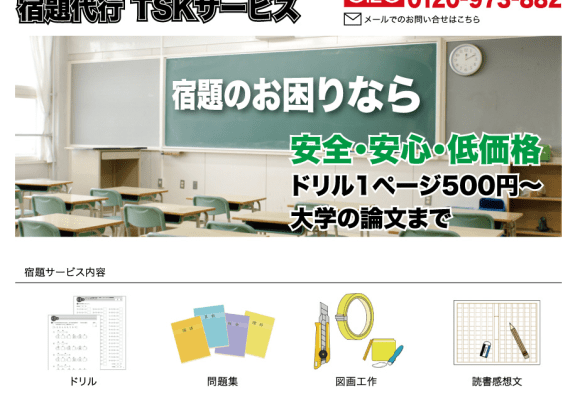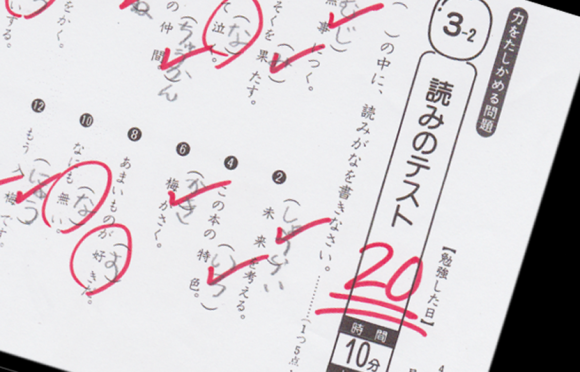
The following is a typical scene that many families in Japan will have recently experienced, and probably not for the first time: It’s August 31, the last day of summer vacation and the fall semester is starting in less than 24 hours. The kids who played all month suddenly realize that they have to do 40 pages of kanji and math drills, write a book report for a book they haven’t read, and fill in 30 days’ worth of journal entries–an assignment that they dutifully kept up with for all of the first week of summer break. They clamor for help, and despite the scoldings and I-told-you-so’s, “nice” parents and the more responsible siblings reluctantly pitch in.
Sure, the above isn’t an exemplary approach to avoiding bad grades, but recently an even more dubious method has been getting a lot of attention: online businesses have been offering to do your child’s homework and school projects for a fee! While the homework-by-proxy racket is nothing new, recent media coverage of the growing enterprise has brought to light this questionable practice and its appalling popularity among elementary and junior high school students.
What does this teach, and not teach, future adults? Why are parents taking advantage of these services for their young children? One twisted reason will probably surprise you.
▼ An example of a homework-by-proxy website, called TSK Service. They tackle anything from art projects to college term papers!

An online search with the keyword “宿題代行” (shukudai daikou, or homework by proxy) quickly produces a plethora of web-based companies. Prices vary, some charging 500 yen (~US $4.75) per page for drills, 3,000 yen ($28.47) for a 400-character book report, or 5,000 yen ($47.45) for a research project. Many sites try to attract business with phrases like “Essays will be written by professionals, not students!” and “Contact us even for one annoying math problem!”
A reporter, whose son just couldn’t do his book report or watercolor assignment, decided to look into these services for the sake of journalism (though the boy certainly lucked out there!) and was stunned by what he unearthed. It turns out that many companies provide work that matches your child’s age as well as mimic youngsters’ handwriting. He could also request a specific level of achievement, as in competition-worthy essays or artworks. Most surprising was the fact that the first three websites he contacted had to turn him down because they were overloaded with work orders. Understandably, the end of summer and winter breaks are peak seasons for these establishments.
The sixth company he emailed finally accepted, and because his was an urgent request he had to pay extra: 10,000 yen ($94.89) for a five-page book report and 8,000 yen ($75.91) for the summer-themed watercolor. He was told that payment was required only after receiving the finished work, which abated his worries about being scammed. Sure enough, three days later he a book report on a classic short story and a rather impressive painting (for a seventh grader) of a field of sunflowers arrived in the mail.
Now another worry arose: what would happen if the teacher decided to enter the painting in an art competition?
1. “Homework has a point because you work hard on it yourself!”

Many online commenters were shocked that such businesses existed, and even worse, were thriving. They pointed out the ridiculousness of this practice, saying “The parents are stunting their kids’ growth!”, “I believe parents shouldn’t even help, but this is much worse,” and “The kids are bound to fail tests this way; how is this benefiting them?” Indeed, not only does having others solve problem sets for you defeat the purpose of such work, but children would be missing out on all of the creative brainstorming and problem-solving opportunities that larger-scope projects provide.
2. “Work you don’t want to do is a part of life! If you’d rather play, then at least deal with the consequences.”

Quite a few brought up the fact that much of schoolwork isn’t about the actual subject matter, but about learning skills like time management, meeting deadlines, and dealing with unpleasant tasks. One said, “If something doesn’t interest you, just do a slapdash job and turn it in. If you can’t manage that, you won’t be able to do anything in life.” Others mentioned that being scolded by a teacher or feeling embarrassed in class may be a life lesson in itself. “I want my kids to grow up honest,” someone else declared. “If they think an assignment is truly pointless, I hope they at least have the cojones to say that to a teacher and accept a zero! ”
3.“Do you get that you’re lying? People these days don’t realize how their actions affect others around them.”

Parents who utilize homework-by-proxy services may be exhibiting a form of affluenza; they don’t seem to realize, or care, that they are letting their children take ownership of someone else’s work, and assignments are no longer reflective of the students’ thoughts, ideas, and abilities. What if a child were to work really hard on an essay or painting, only to lose to some adult in a competition? Unfortunately, a news program recently revealed that one proxy business had in fact swept a student art contest, and that the parents were still happy with their kids’ awards. Bewildered citizens lamented, “What’s this world coming to? How can you be happy about winning first place if you didn’t even work on it.”
4. “We’re teaching grade-schoolers that money solves everything?!”

Though not to condone the practice, it’s one thing for adult college students to decide to buy a professionally written term paper with their own money, and quite another for sixth-graders to shirk their obligations and then discover that they can still avoid the repercussions, as long as their parents shell out some cash. Do some parents no longer value effort and the satisfaction felt by accomplishing a difficult task with your own strength? One netizen joked wryly, “Soon teachers will be sending out handouts to the parents, saying ‘Please do not pay professionals to handle your child’s work.’”
5. The flip-side
While no specific percentages are given, further research revealed that although some parents admit to relying on these services because they don’t want to look over their kids’ homework, quite a few pay professionals so that their kids can focus on studying for elite junior high and high school entrance exams, without being bogged down by inane projects. Perhaps to these parents, this is the same as paying for tutors and heaps of study guides in order to get ahead. And if their kids can manage cram school and pass important tests, they must have acquired enough life skills without all that homework, right?
In the same vein, devil’s advocates argued, “If the point of homework is to turn it in, what’s the difference?” Some flippantly said that the kids are learning street smarts and problem-solving skills, as well as the merits of delegating duties. “It’s ethically wrong but if a high school kid uses his own money to get by without any adults catching on, then that’s a life skill right there.”

Finally, others questioned the morals of the actual business owners. “I understand about supply and demand but this is still sad,” said one commenter regretfully. However, like UKEssays.com, many of these entrepreneurs insist that they’re only providing study aids and references to help with students’ grades. But who wants to bet that a lot of students aren’t even reading over the work that they buy and turn in as their own?
For example, one website called ShukudaiHelp3 proudly thanked its “supporters” for a busy 2014 summer season. They went on to say that since their inception 10 years ago, they have been providing solutions to people’s lives, and implied that they are only providing information that any student would be glad to have access to. When asked their opinion on what they do, they stated that while it’s not good to avoid all of life’s challenges, it’s not wrong to rely on proxy services in times of emergency and to lead an “efficient” student life.
Unfortunately, that website was started by a group of high schoolers who wanted to contribute to society despite their non-adult status; somewhere along the line it seems like their good intentions became distorted, only to reemerge as self-contradiction. Still, some are inclined to think that homework-by-proxy services will have no measurable effect on society in the long run. For families with money, will these businesses become an indispensable part of childhood one day, as natural as asking a grown-up for help or (try not to do this, kids!) copying a friend’s answers? And would you feel slightly cheated if you found out that I hired a professional writer for this piece? Just kidding.
Sources: Yahoo! Japan, News-yasan, Shukudai9, UK Essays, ShukudaiHelp3, Sakubun Daikou Service
Feature image: Chibi Maruko-chan via YouTube

 High school teacher’s summer vacation homework about appreciating life brings tears to our eyes
High school teacher’s summer vacation homework about appreciating life brings tears to our eyes Board of education suspends Japanese teacher who stockpiled 750 pairs of panties at school
Board of education suspends Japanese teacher who stockpiled 750 pairs of panties at school “Peaceful life with many dogs” is unacceptable dream, Japanese high school teacher tells student
“Peaceful life with many dogs” is unacceptable dream, Japanese high school teacher tells student When bullying happens in Japan, should parents go to the police? We ask an educator
When bullying happens in Japan, should parents go to the police? We ask an educator Japanese elementary school kid says 12 x 25 = 300, teacher doesn’t say he’s answered correctly
Japanese elementary school kid says 12 x 25 = 300, teacher doesn’t say he’s answered correctly Foreigner’s request for help in Tokyo makes us sad for the state of society
Foreigner’s request for help in Tokyo makes us sad for the state of society McDonald’s Japan’s new pancake pie is a taste sensation
McDonald’s Japan’s new pancake pie is a taste sensation Bad tourist manners at Mt Fuji Lawson photo spot prompts Japanese town to block view with screens
Bad tourist manners at Mt Fuji Lawson photo spot prompts Japanese town to block view with screens Studio Ghibli unveils massive T-shirt collection featuring top anime movie characters
Studio Ghibli unveils massive T-shirt collection featuring top anime movie characters FUK COFFEE?!? Japanese cafe has a perfectly innocent reason for its startling-looking name
FUK COFFEE?!? Japanese cafe has a perfectly innocent reason for its startling-looking name Bear attacks car in Japan, breaks windshield with its paw【Video】
Bear attacks car in Japan, breaks windshield with its paw【Video】 Who wins in a battle of McDonald’s and Komeda Coffee’s chicken tatsuta burgers?【Taste test】
Who wins in a battle of McDonald’s and Komeda Coffee’s chicken tatsuta burgers?【Taste test】 Two things to do, and two things not to do, when leaving a traditional Japanese inn
Two things to do, and two things not to do, when leaving a traditional Japanese inn One of Japan’s oldest castles now lets travelers spend night on the grounds, drink in its keep
One of Japan’s oldest castles now lets travelers spend night on the grounds, drink in its keep Hatsune Miku comes to Magic: The Gathering with official crossover cards【Photos/Video】
Hatsune Miku comes to Magic: The Gathering with official crossover cards【Photos/Video】 Japanese ramen restaurants under pressure from new yen banknotes
Japanese ramen restaurants under pressure from new yen banknotes Red light district sushi restaurant in Tokyo shows us just how wrong we were about it
Red light district sushi restaurant in Tokyo shows us just how wrong we were about it McDonald’s new Happy Meals offer up cute and practical Sanrio lifestyle goods
McDonald’s new Happy Meals offer up cute and practical Sanrio lifestyle goods Tokyo Tsukiji fish market site to be redeveloped with 50,000-seat stadium, hotel, shopping center
Tokyo Tsukiji fish market site to be redeveloped with 50,000-seat stadium, hotel, shopping center Japanese city loses residents’ personal data, which was on paper being transported on a windy day
Japanese city loses residents’ personal data, which was on paper being transported on a windy day Beautiful Red and Blue Star luxury trains set to be Japan’s new Hokkaido travel stars
Beautiful Red and Blue Star luxury trains set to be Japan’s new Hokkaido travel stars Ghibli Park now selling “Grilled Frogs” from food cart in Valley of Witches
Ghibli Park now selling “Grilled Frogs” from food cart in Valley of Witches New definition of “Japanese whiskey” goes into effect to prevent fakes from fooling overseas buyers
New definition of “Japanese whiskey” goes into effect to prevent fakes from fooling overseas buyers Our Japanese reporter visits Costco in the U.S., finds super American and very Japanese things
Our Japanese reporter visits Costco in the U.S., finds super American and very Japanese things All-you-can-drink Starbucks and amazing views part of Tokyo’s new 170 meter-high sky lounge
All-you-can-drink Starbucks and amazing views part of Tokyo’s new 170 meter-high sky lounge More foreign tourists than ever before in history visited Japan last month
More foreign tourists than ever before in history visited Japan last month New Pokémon cakes let you eat your way through Pikachu and all the Eevee evolutions
New Pokémon cakes let you eat your way through Pikachu and all the Eevee evolutions Disney princesses get official manga makeovers for Manga Princess Cafe opening in Tokyo
Disney princesses get official manga makeovers for Manga Princess Cafe opening in Tokyo We try out “Chan Ramen”, an underground type of ramen popular in the ramen community
We try out “Chan Ramen”, an underground type of ramen popular in the ramen community Sales of Japan’s most convenient train ticket/shopping payment cards suspended indefinitely
Sales of Japan’s most convenient train ticket/shopping payment cards suspended indefinitely Sold-out Studio Ghibli desktop humidifiers are back so Totoro can help you through the dry season
Sold-out Studio Ghibli desktop humidifiers are back so Totoro can help you through the dry season Japanese government to make first change to romanization spelling rules since the 1950s
Japanese government to make first change to romanization spelling rules since the 1950s Ghibli founders Toshio Suzuki and Hayao Miyazaki contribute to Japanese whisky Totoro label design
Ghibli founders Toshio Suzuki and Hayao Miyazaki contribute to Japanese whisky Totoro label design Doraemon found buried at sea as scene from 1993 anime becomes real life【Photos】
Doraemon found buried at sea as scene from 1993 anime becomes real life【Photos】 Tokyo’s most famous Starbucks is closed
Tokyo’s most famous Starbucks is closed One Piece characters’ nationalities revealed, but fans have mixed opinions
One Piece characters’ nationalities revealed, but fans have mixed opinions We asked a Uniqlo employee what four things we should buy and their suggestions didn’t disappoint
We asked a Uniqlo employee what four things we should buy and their suggestions didn’t disappoint Japanese teacher criticized for attending son’s entrance ceremony instead of her own school’s
Japanese teacher criticized for attending son’s entrance ceremony instead of her own school’s Japanese schoolgirl commended by police for helping lost child
Japanese schoolgirl commended by police for helping lost child How Japanese universities are trying to help worried parents by babying their students
How Japanese universities are trying to help worried parents by babying their students Uncle and netizens confused about child’s low grade on math assignment
Uncle and netizens confused about child’s low grade on math assignment Japanese teacher beats up student for making fun of his body by calling him anime character name
Japanese teacher beats up student for making fun of his body by calling him anime character name Math-solving phone app is the quickest way to self-study, skip homework, and/or fail your tests
Math-solving phone app is the quickest way to self-study, skip homework, and/or fail your tests “Do you have a lot of money?” Japanese kid crushes day care worker with innocent cruelty
“Do you have a lot of money?” Japanese kid crushes day care worker with innocent cruelty Petition to allow students to choose what they wear to school gathers almost 19,000 signatures
Petition to allow students to choose what they wear to school gathers almost 19,000 signatures Japanese government promises reduced teacher responsibilities, right to refuse club supervision
Japanese government promises reduced teacher responsibilities, right to refuse club supervision Japanese high school teacher in hot water after forcibly giving male student a buzz cut
Japanese high school teacher in hot water after forcibly giving male student a buzz cut Student penalized for writing the number “4” the “wrong” way on worksheet
Student penalized for writing the number “4” the “wrong” way on worksheet Is Japan overworking its teachers? One exhausted educator says, “YES!”
Is Japan overworking its teachers? One exhausted educator says, “YES!” Japanese McDonalds’ branch bans an entire middle school from entering the restaurant
Japanese McDonalds’ branch bans an entire middle school from entering the restaurant Japanese mom praises hard-studying teenage son…for his Pokémon notes?!?
Japanese mom praises hard-studying teenage son…for his Pokémon notes?!? What do Japanese kids want to be when they grow up? For 30 percent of boys, YouTubers, survey says
What do Japanese kids want to be when they grow up? For 30 percent of boys, YouTubers, survey says You can now buy bully insurance for your kids in Japan
You can now buy bully insurance for your kids in Japan
Leave a Reply